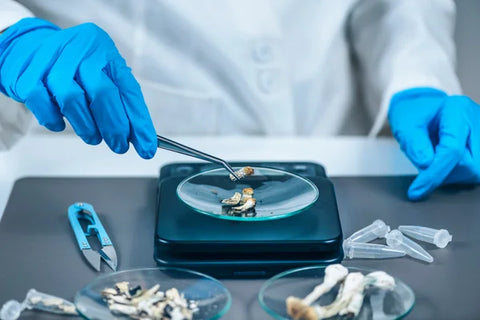Magic mushrooms are far from new. In fact, some historians suggest that North African societies were consuming shrooms for their hallucinogenic effects in 90,000 BC! Not to mention South and Central American Indians have deemed them sacred for centuries, dubbing them "flesh of the gods."
Granted, this lineage has come under fire by other historians who say it's an overly romanticized version of the truth driven by confirmation bias. But regardless, we're going to dive into the history of the scientific therapeutic research conducted on these aptly named shrooms to see what experts throughout the years have concluded.
The Spark That Ignited the Research Fire
Psychedelic mushrooms were re-popularized in 1957 when LIFE Magazine published an article with a photograph featuring R. Gordon Wasson, a shroom enthusiast, with an American banker.
Four years prior (1953), Wasson came across a tribe utilizing mushrooms in Mexico and sent a sample of them to Albert Hofmann, the chemist known for finding LSD.
Hofmann isolated psilocybin (the psychoactive chemical in magic mushrooms — the "magic maker," if you will) and developed a synthesis in his lab. Soon after, he started distributing 2 mg psilocybin pills for research purposes and ignited the fire.
The Roaring Research Fire
Following the Swiss chemist's distribution, thousands of psilocybin doses were administered in clinical experiments by scientists, psychiatrists, and other mental health professionals for two decades.
The results showed that the psychoactive compound has the potential to meet therapeutic needs for a wide range of psychiatric diagnoses, such as:
- Alcoholism
- Addiction disorders
- Autism spectrum disorders
- Obsessive-compulsive disorder
- Depression
- Schizophrenia
Interestingly, contemporary pharmacological reports and anecdotal evidence suggest magic mushrooms provide these therapeutic necessities without the overdose risk or addictiveness of drugs like cocaine, methamphetamine, alcohol, heroin, and others.

Stoking the Embers: 1950s and 1960s
The first English language report on LSD-assisted alcoholism treatment was published in the 1950s, prompting a grand but short-lived correlation between psychology and psychiatry.
The results of the study showed that the psychedelic had promising therapeutic and clinical effects, which continued for six months following a single (but high) dose.
If the results were so positive, why the short-lived relationship?
Well, the mid-1960s rolled around, and with it came belt-tightening prohibitive legislature, which pretty much ended all primary psychedelic research.
From 1968 until the mid-to-late 1990s, psilocybin (and other psychedelics) were entirely wiped from scientific research.
Refueling and Fanning the Flames: 1996 and the 2000s
After a 25-year hiatus, human psychedelic research started to reintroduce itself into the therapeutic field. And you might find it surprising to note just how many studies have occurred since the beginning of the revival.
Building on Previous Works
One of the most notable studies occurred in 2012, building on the work of the 1950s study on LSD. It examined psilocybin and its effects on those with alcohol use disorder (AUD) and cigarette addiction.
Those who held the original LSD research in high regard were not surprised by the findings — psilocybin demonstrated considerable improvements in both patient types.
Assessing Psilocybin and Cancer-Related Depression and Anxiety
A 2016 study published in the Journal of Psychopharmacology aimed to prove the suggestion found in previous studies that psilocybin could decrease anxiety and depression in cancer patients.
Fifty-one cancer patients with terminal diagnoses and depression/anxiety symptoms took part in a double-blind, randomized, cross-over trial to investigate the effects of a placebo-esque dose versus a high dose of the chemical compound.
Frankly, the results were astounding.
High-dose psilocybin presented huge decreases in self- and clinician-rated measures of anxiety and depressed mood. Alongside that, it brought about increased quality of life, optimism, life meaning, and deceased death-related anxiety.
Six months after the doses were administered, the effects were sustained, with positive impacts on mood, life, relationships, spirituality, and sense of self.
Overall, roughly 80% of the participants said (and proved) that psilocybin had moderately or greater increased their life satisfaction and well-being.
2018 Brings a Breakthrough Therapy Designation
Due to the continued research into psilocybin-assisted treatments since the too-long hiatus, government officials have begun loosening their previously tightly held restrictions.
So much so that in October 2018, the U.S. Food and Drug Administration (FDA) granted a Breakthrough Therapy Designation to a psilocybin therapy for depression.
And mere months later, the FDA recognized another psilocybin-based therapy for major depressive disorder, awarding it the same Designation.
But what do these Designations mean?
Essentially, they allow researchers to continue the impressive work and accelerate the process of drugs that show remarkable promise in curing and/or managing serious conditions — psychiatric or otherwise!
John Hopkins Medicine's 2019 Center Launch
In late 2019, the brilliant minds at John Hopkins Medicine opened their Center for Psychedelic and Consciousness Research to examine the effects of LSD and psilocybin on patients with addiction, depression, anorexia, and other mental health disorders. They focus on how these compounds impact behavior, brain function, biological health markets, cognition, and mood.
And they've been exploring and publishing groundbreaking studies on a wide range of potentially game-changing psychedelic research ever since.
Will The Magic Mushroom Therapeutic Research Fire Continue Burning?
While the reinvigorated interest in psilocybin research has been beleaguered by many years of dormancy, the fairly recent FDA Designations have bolstered scientists' efforts.
Thankfully, it appears research will continue!
Since psilocybin and other psychedelics have shown immense therapeutic promise, potentially holding the key to unlocking currently unmet medical needs and saving lives, the research fire should continue burning — and, hopefully, growing.
References
https://psychedelicalpha.com/learn/history-of-psilocybin-research-and-investment
https://drugpolicy.org/drug-facts/history-psychoactive-mushrooms
https://pubs.acs.org/doi/10.1021/acsmedchemlett.0c00048#
https://www.ncbi.nlm.nih.gov/pmc/articles/PMC5603818/
https://psychedelicalpha.com/learn/future-prospects-for-psilocybin-and-psychedelic-medicines
